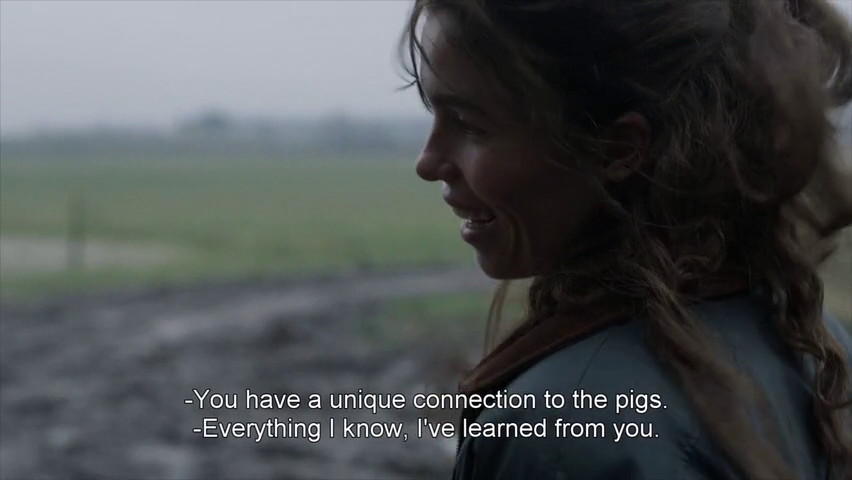Is it possible to not scratch if one breaks out in hives? As kids, my friend and I used to concoct solutions from household chemicals and spray them at wasp nests. The wasps thrillingly came for us then, and we ran inside and shut the door. This same friend now keeps bees, and loves to talk about royal jelly, which makes a larva a queen. The worker bees produce this substance with the biological machinery of the hive of which they are a part. The gather round and make a queen. English feels that bee colonies are early industrial factories, less with the connotation of soot, exhaustion, and disease than of the mechanization of bodies. Insects seem to us to already be machines or machine-like; when we imagine nanotechnology we often imagine swarms of insects.
A cat with hives, having only claws to scratch with, breaks her skin and makes bleeding wounds and scabs. The word for human scratching instruments isn’t any less sharp, and nails can be used to wound, too. When we were children, there was a girl who played with my brother and I who sharpened her nails into points and cut open my brother’s arm. The Hale-Bopp comet was passing over, and it felt as if its bright spray was falling onto us at night. It was incredible that there was any of it left, its whole glamour being made by the dissolution of itself.
The cat scratches my chest, kneads it, his claws working through my shirt into my skin. I’m drinking a glass of milk, which he keeps sniffing, and I have to move the glass away from him to keep him from drinking it. He has a tendency, as I think all cats do, of treating parts of my body separately. He could be laying on top of my legs, and if my hand moves near him, he will bite it. I feel he’s attached to me, feeling erroneously that I am something. To him I’m large, but I don’t contain multitudes, because there’s no container.
At a cheese festival, multitudes clamor to get a position at long tables where morsels of cheese are doled out. “Some people really enjoy work involving face time, and some absolutely do not,” one of the booth workers says to one of the few drunken attendees whose eyes go to his eyes, which are up here. Eyes mostly stay down on the cheese, not even on the hands, the workers hands or their hands, which in concert move cheese into mouths. The mouths are in a certain sense on the table, but if they were in the usual sense, the four legs of the tables would sway under the weight of the mouths’ desire for cheese. Every year the festival has more booths of alcohol, creating for the mouth the inverse of the situation of the eyes: inhibitions go down and appetite goes up.
Every morning a cheesemaker’s cat walks on her chest, “a sensitive area.” The cheesemaker doesn’t understand people who keep reptiles. She knows someone who keeps a python, which, she says, could strangle you in your sleep. At night, her cat wraps herself around her neck, like an airplane pillow on the wrong side. Mechanical milking processes, she says, in their insensitivity to the flesh the machines milk, scratch and chafe the animal, causing her to bleed into the milk. Dairies adulterate bloody milk with a base to remove the pinkish cast. Articles and pronouns get strange here; it’s her milk but it’s a product, and even her lactation is a product, the result either of hormones introduced to her body by the dairy, or the result of compulsory copulations: The females who don’t get pregnant in their minglings with males are eventually slaughtered.
If they’re not jockeying for position at booths at the cheese festival, they’re mingling. Every group at the festival, every group everywhere, is made up of open mouths, teats, and eyes. Parts do not have to be parts to be parts. The mouths open to give off the exoskeletal glint of defensive amusicality. They sound certain because they are not. The mouths spew facts from the cultural ether; the mouths need. Pop science splits everything into its most banal components, and is deployed not for its truth, as its purveyors would have us believe, but for its neutral affect, its lack of drama. The purpose is to find the shortest line between mystery and explanation, trouble and solution, in hopes that nothing leaves a trace in the body. The mouths, in short, chew their food. The mouths want to consume the products of bodies with an etiology in order to feel that their bodies are without one–have no causes, no impurities, no mothers. Everything must be fixed. An individual must have only a “mental health crisis”, sensitive areas not spoken of, bodies covered, animals not cause more discomfort and pleasure than humans, holes in a story filled, wrong opinions–wrong only in the sense that they produce feeling–reeducated, gossip ignored, bad habits corrected or at least judged, story brought to stillness. The teeth bare and gnash, but let’s not pick on teeth. Not everything has to be sliced and mashed with the goal of removing its taste.
